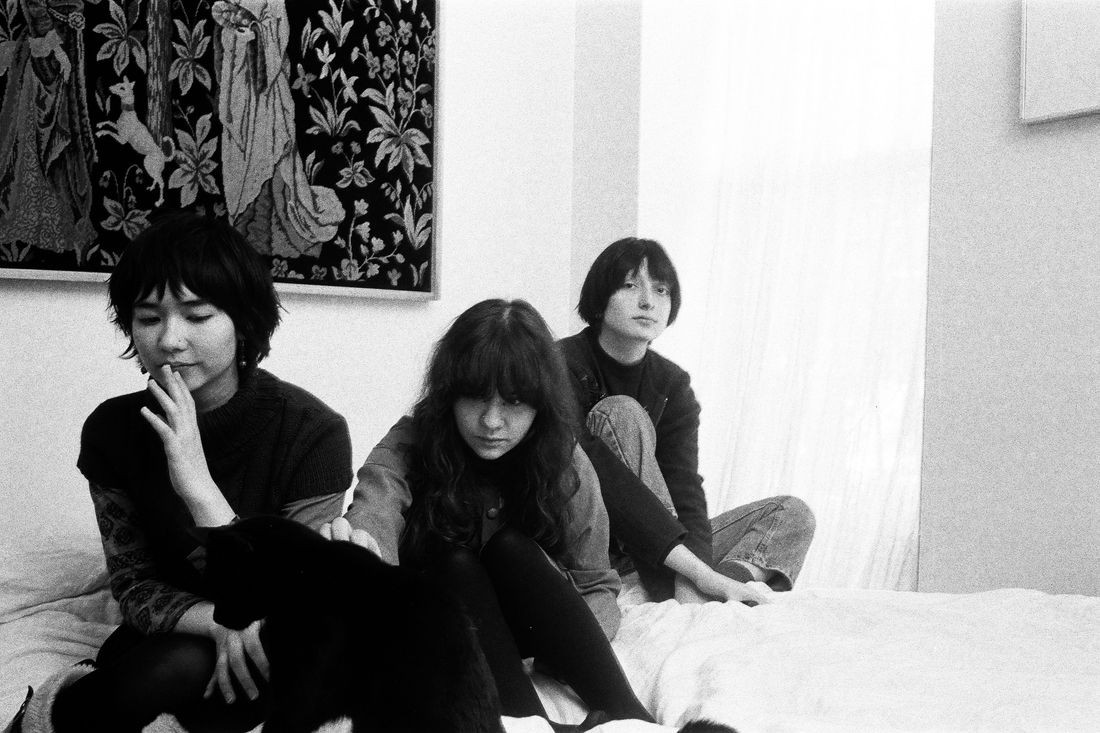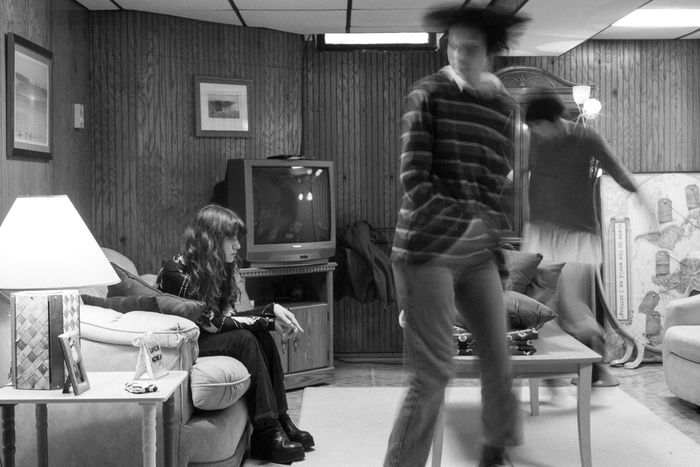
Want to understand the rock band Horsegirl? Watch the members shop for music together. On a Saturday in March at Reckless Records, one of the band’s favorite stores in their hometown of Chicago, the trio of 18- and 19-year-olds immediately take to the CD section — to them, they are cheaper, more shareable, and easier to play in the car. There, they carefully and near-silently pore over some of the more beloved and esoteric indie-rock releases of the past 40 years: albums by the Brit-pop group Suede, the lo-fi pop outfit Beat Happening, and the English post-punks Clinic. “I feel like Clinic is meant to be owned as a CD,” singer-guitarist Penelope Lowenstein says, without explanation, and her bandmates agree. They’re not searching for themselves but for the good of the group. At one point, drummer Gigi Reece points Lowenstein toward a copy of Brian Eno’s Another Green World, which Lowenstein had been looking for, but she decides it’s not worth the $8 price tag. Later, singer-guitarist Nora Cheng locates The Power Out by the English art-rock band Electrelane, a Horsegirl favorite. “What the F?!” Reece exclaims (not because they don’t curse; the shorthand is an inside joke). They beg Cheng for it since she already owns another Electrelane CD. Cheng eventually relents. Once the band gets back to Reece’s old Buick, the disc immediately goes into the CD player for everyone to hear.
At times, Horsegirl’s music can sound like all of the artists they picked out at Reckless — and dozens more across the 1980s and ’90s post-punk, no-wave, and college-rock scenes, from Gang of Four to Stereolab. But those specific inspirations combine to make something distinct: dense, homespun rock music that blends teenage excitement with a serious reverence for the form. The band’s just-released debut album, Versions of Modern Performance, is the best proof yet. In a cresting wave of new, young rock artists, Horsegirl stands out for being particularly well-studied, making music that teens can enjoy just as well as adults who grew up on the trio’s influences. It’s what led the group to join Matador Records — home to heroes like Yo La Tengo, Pavement, and Belle and Sebastian — in early 2021, off the strength of their surrealist 2020 single “Ballroom Dance Scene,” which became a slow-burning hit thanks to critical acclaim and repeat plays on SiriusXM. Signing with the label had been a dream for Horsegirl. “We were looking for Matador,” Reece says.
A love of indie rock first brought the them together. Lowenstein “grew up around a lot of cool music,” but she didn’t fully appreciate it until she became a teenager, at about the same time she met Cheng and Reece through extracurricular music programs. It was after Lowenstein finished middle school, and “the Parquet Courts record had just come out” — by which she means 2018’s Wide Awake!, a reminder of how young the band really is. Cheng had already gotten into Television and Pavement by then but says Lowenstein helped her see that Belle and Sebastian is “the best band in the world, literally”; she also remembers Lowenstein recommending canonical albums like Interpol’s Turn On the Bright Lights and Yo La Tengo’s I Can Hear the Heart Beating As One. Sharing the music brought Lowenstein closer to it, too. “Being able to indulge in it with another kid who is relating to it as a thing for young people is why it resonated,” she says. That only amplified when they formed Horsegirl around their growing shared tastes. “We just found all this purpose in it that you don’t have when it’s just your parents’ music.” The band even wrote about it on “World of Pots and Pans,” a single from Modern Performance that threads a smattering of indie-rock references (A line like “I think you’re just like honey and heaven, too” flicks at both the Jesus and Mary Chain and the Cure) to describe a friendship.
Past Horsegirl, many of the most promising rock acts at the moment are young musicians. Pop punk is back thanks largely to Gen Z’s efforts, from stars like Olivia Rodrigo and the Linda Lindas to ascendant acts like Meet Me at the Altar and Pinkshift. And young people are innovating outside that sphere as well, including Southern-gothic singer-songwriter Ethel Cain and art-rockers Geese. All of these artists are building on easily identifiable rock touchstones in fresh ways. What makes Horsegirl stand out is the band’s ability to turn a more specific, wide-ranging web of influences into music that never sounds derivative. Spending hours with the group gives the sense that, more than anything else, it comes down to them knowing this music inside out — and channeling the youthful passion of their icons. At the same time, the trio is less serious in person than how their songs come off and more outgoing than you’d expect a group of teenage music nerds to be. Lowenstein is a confident spokesperson, Reece throws in the most jokes, and while Cheng may be the quietest, she’s just as excitable about music as her bandmates. They watch lots of reality TV together — Project Runway at the moment, after finishing Survivor: Cagayan — and try to get their tweets onscreen during Anderson Cooper and Andy Cohen’s New Year’s Eve special every year.
When they first formed, Horsegirl couldn’t book most venues in town, so they quickly found a network of young musicians and artists like themselves, such as Lifeguard, a post-rock group that includes Lowenstein’s younger brother Isaac and formed in part thanks to a Horsegirl set, and Friko, an indie-pop band that Horsegirl played one of their first non-DIY shows with. They joined the others in organizing their shows and assisting one another’s creative efforts, building a self-sustaining scene. “We don’t need anyone else,” Lowenstein says. “You need a music video, someone can help you. You need a poster, someone can do it for you.” Horsegirl carried that attitude to their record-release show, booking Lifeguard and Friko to open at the 800-capacity Thalia Hall. Thinking about their scene, the song “Born in the Wrong Time” by Great Unwashed comes to mind. The underground band was signed to New Zealand’s Flying Nun Records, one of Horsegirl’s favorite labels, in the early ’80s. “They were in this scene that we look back on, and we’re like, ‘Oh my God … they were in the perfect time,” Lowenstein says. “So now, we’re like, We were born in the right time, and we live in Chicago, and everyone in Chicago was born at the right time.”
After collecting their haul of CDs, the band walks down the street to Shuga Records, where they played some of their first proper shows. Lowenstein remembers emailing restaurants and laundromats in her neighborhood, trying to book a gig. Shuga was the only venue that responded, but the band was still thrilled. “Playing a record store was the dream in those days,” she says. Now, the store’s owner, Adam Rosen, is asking them to sign a copy of their debut seven-inch vinyl, “Billy,” which happened to hit stores today. (They already took pictures with a copy at Reckless.) “You guys are going to be fucking bananas big,” Rosen tells them. He says he ordered around 150 copies of their debut album, and the band laughs nervously. “Hopefully they sell,” Reece jokes.
Versions of Modern Performance is one of the most confident debuts of the year, the band’s playful-yet-precise vision of rock in full-length form. It’s a propulsive album thanks to the trio’s energy: a run of extremely listenable pop-rock songs that rarely abates. The songs sound like intricate rock tapestries — step back to appreciate the hooky guitar riffs and imposing walls of sound; up close, delicate individual chords and rhythms can dazzle just as well on their own. And the lyrics work the same way, straying from personal songwriting in favor of odd, vivid observations (“When a fly’s trapped in a car without a key, how does it breathe?” Cheng asks on “Beautiful Song”) that, taken together, form full images. Making the album was the band’s first studio experience after recording their earliest songs in basements, including the practice room at Lowenstein’s parents’ house. For Modern Performance, Horsegirl worked with the producer John Agnello, whose credits include Sonic Youth, Dinosaur Jr., and the Breeders. Despite his résumé, the group describes him as sweet and approachable, adding that they still text him about school and music. Agnello remembers the band coming in with a playlist of references that both included songs he’d produced and others he’d never heard of. Impressed by Horsegirl’s musicianship, he pushed them to do multiple takes and kept his editing to a minimum. “When I say the album is them, I mean the album is them,” Agnello says over the phone. “I knew that they could do it.” So much, in fact, that he helped the band secure the ultimate co-sign, recruiting Sonic Youth guitarist Lee Ranaldo and drummer Steve Shelley to contribute to two songs.
A part-by-part recording checklist for each track now hangs in the corner of their practice room next to dozens of band posters and Horsegirl mementos. Those also include a sheet of paper that Lowenstein wrote “MIKE HERE” on to alert her bandmates that Mike Kinsella — the Chicago legend of bands like American Football and Cap’n Jazz — had walked into the studio one day. He was coming by to say hi to Agnello and drop off some lunch and ended up playing WhirlyBall (a bumper cars meets lacrosse meets basketball game popular in the Midwest) with the band.
“This album couldn’t have been made anywhere but Chicago,” the band writes in the credits to Modern Performance. They’re referring to a number of things, from the days and nights spent in Lowenstein’s basement to the scene that nurtured them. “We know our comfortability here is something we will never, ever get somewhere else,” Reece says. The album itself is also a document of their last summer together in the city before Reece and Cheng left for college in New York City. The two now attend the New School and New York University, where they’re considering majors in anthropology and English, respectively. They’re excited to spend the summer together, touring North America and Europe, and for Lowenstein to join in New York in the fall (also at NYU, for art history; Agnello wrote her a letter of recommendation). Yes, they’ll be away from their scene, but they’ll still be able to collaborate and book shows, like opening for labelmate Pavement in October.
After a detour to pick up Korean fried chicken, the trio soon makes its way to their friend Eli Schmitt’s apartment. They met him through a “record club” he started — like a book club but for albums — and ended up filming the video for “Billy” at his place with a bunch of their other scene friends. Schmitt even credits the group for inspiring him to start playing drums for a band called Post Office Winter, also on that record-release bill. “Just knowing you guys and knowing that ethos and being a part of that, I’m like, Oh, yeah, I can totally do that,” he tells them. This is one of Horsegirl’s biggest goals, past Matador and the album and tour dates: to be part of a new, young rock movement. “Maybe kids our age who grow up with this band existing, and we all get older together, and the DIY ethos — if that becomes greater than just Chicago, then I would feel very satisfied,” says Lowenstein. Reece puts it more directly: “Kids are going to bring punk rock back. And we want to put our foot in the door of doing that.”



